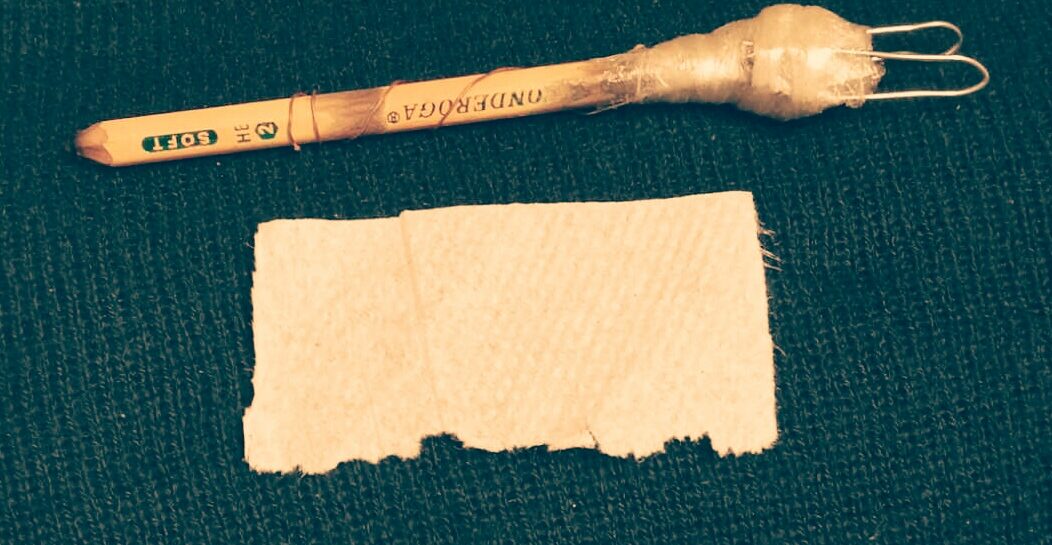Within Georgia Department of Corrections facilities, the contraband tobacco industry is robust enough to support a cottage industry for rolling papers. Commercial rolling papers are brought in as contraband too, but supply is nowhere near enough to meet demand. A pack of loose tobacco with 36 rolling papers will be stretched into 70-plus prison-size cigarettes, but the number of rolling papers stays the same.
For the past decade or so, the main product that fills this gap has been Brown. So named for the brown 1-ply paper towels that form its base, Brown is infused with strong coffee, pressed, dried and portioned into individual rolling papers. Advertising the promise of a heightened buzz from smoking not just nicotine, but also caffeine. It’s a dubious marketing claim, but an effective one since cigarettes and coffee have always gone hand-in-hand.
“Hustling this Brown keeps me smoking,” Gene* told Filter during a recent visit to his cell, while he busied himself making Brown with kitchen coffee he’d saved from his breakfast.
“I have been smoking cigarettes all my life, but I can’t sell them because I smoke all my product and end up in debt,” Gene said. He moved some paper over to the windowsill to dry. “I haven’t had money on my commissary account in years.”
Wood pulp doesn’t regulate the heat as well as cellulose. Compared to commercial rolling papers, Brown papers make for a faster burn and heavier but they’re also about five times cheaper. Usually two for $1, or two for one soup in facilities on the soup currency exchange.
Unlike, say, moonshine, which someone running a homemade still in their cell every night can sell for $50 a soda bottle, Brown isn’t particularly lucrative. It’s a side hustle on par with making beds or cleaning sneakers, where usually one person in the living unit—maybe two—emerges as the person who does it the best. And Gene is ensured a steady customer base, as our exorbitantly priced tobacco supply continues arriving without the means to smoke it.
All the top-quality religious tomes printed on thin rice paper were smoked away years ago.
Quality hardback encyclopedias have a few transparencies in the biology sections, thin cellulose pages depicting the anatomies of leaves and such. All the top-quality religious tomes printed on thin rice paper were smoked away years ago, but my favorite was The Urantia Book, a soft-cover copy with about 500 pages of thin yellow rice paper. Prisoners new to the system, who never knew of rice-paper Bibles, still use the regular ones because they heard somewhere that “Bible paper” was the best-quality option.
Ink can be stripped from paper with acetone, which evaporates and doesn’t leave a bad taste behind. It doesn’t leave the page perfectly blank, but this isn’t about aesthetics.
The waxy paper covers from individual toilet paper rolls, crumpled up then flattened out, work great but taste awful. The paraffin coating from toilet paper roll covers can be removed with hot water, but if you just put it under a faucet it’ll tear. So you have to do it in a bowl with near-boiling water, and poke each individual square down to the bottom and watch the beads of come off patchily.
In dire straights—in the hole, when you have nothing else—you can use toilet paper itself. Three layers, dampened then dried. Rolled as tightly as possible, which isn’t very. You can twist off a small cone from the cardboard tube to make a mouthpiece. These burn fast.
The rarest are rerolls of cigar leaves, to make small blunts. But they come with an excess of leftover cigar tobacco that has to be wrapped in paper, or piped.
People tire of going through the process to remove ink and paraffin, and just smoke them.
Tobacco prices and paper shortages being what they are, many find pipes more appealing than cigarettes. The product lasts longer and is more enjoyable. But sourcing the materials tend to involve some combination of extra labor, expense and risk.
People who still care about their fingertips might make pipes from ink pen barrels. Every once in a while, someone assigned to a maintenance detail with access to the right size of brass fittings would make them into old-school straights. I have fond memories of a straight shooter pipe made from bamboo stalk, about as thick as your little finger. Cut it on either side of a joint and poke through the center with a tenpenny nail.
Eventually people give up on the ink pen smoking guards and just abide the burns. Prison’s many metal detectors spoil the fun of carrying a brass pipe, and my bamboo was confiscated long ago. People tire of going through the steps to remove ink and paraffin from the paper, and just smoke them along with the rest of chemicals.
The encyclopedias went fast, and it’s hard to imagine they’ll ever be replaced. Even without all the cigarette smokers reluctant to offend God, the chaplain could barely keep up with demand for the rice-paper Bibles. Eventually administration stopped giving them to us.
*Name has been changed
Photograph of Brown rolling paper courtesy of Anonymous. The pencil implement, or “popper,” is plugged into a wall outlet to function as a lighter.





Show Comments